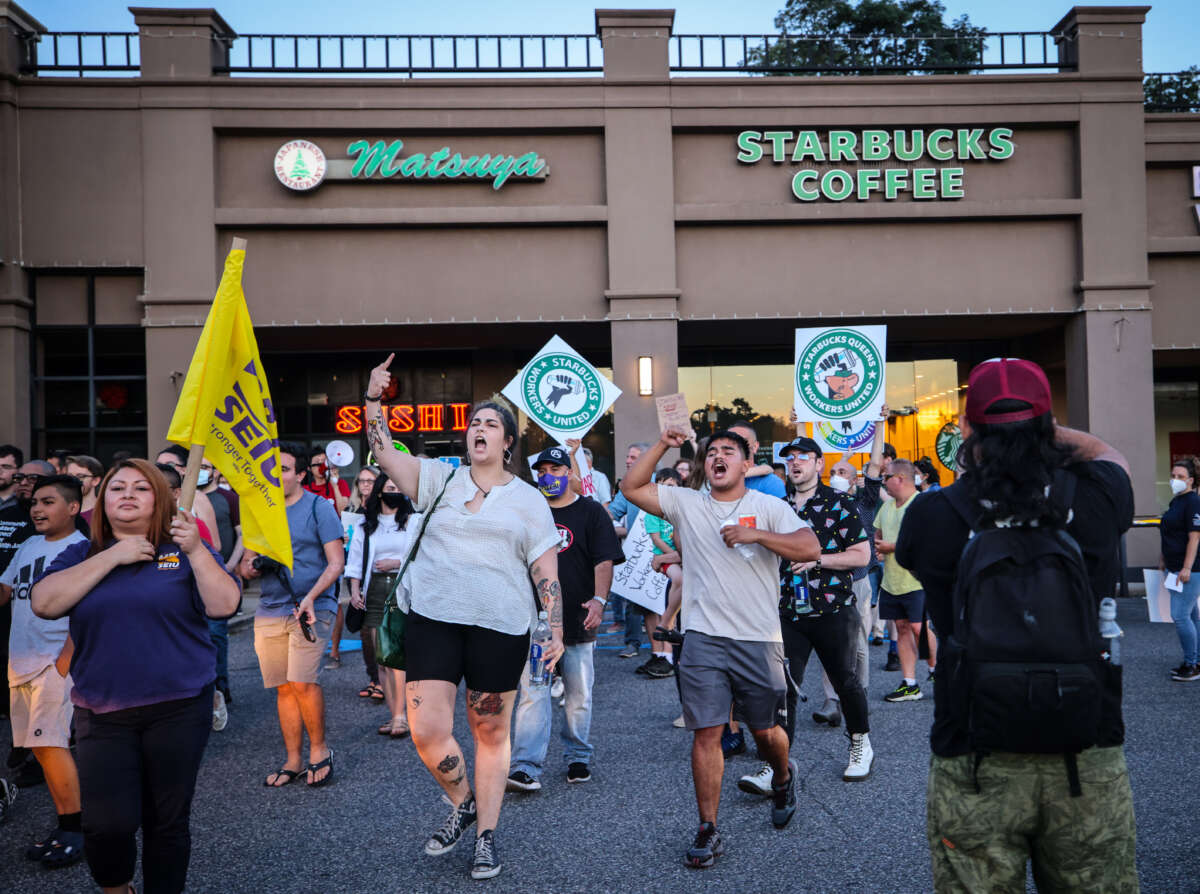As Starbucks held its annual shareholder meeting on Thursday, Starbucks Workers United unveiled seven new union filings in states spanning from the South to the Pacific Northwest in the largest announcement of new unionizing stores since last spring.
Stores in Colorado, Kentucky, Michigan, Ohio, Oregon and Washington announced their union efforts this week as the union approaches a new milestone of 300 unionized stores — a remarkable feat to achieve after workers only publicly revealed the union effort just a year and a half ago. As of earlier this month, according to labor officials, the union has won 290 petitions so far, with an over 80 percent win rate.
“After over ten years with Starbucks, I feel like we, the baristas, finally have a voice,” said Micah Grogan, who works in a unionizing store in Lincoln City, Oregon, in a statement. “By joining Starbucks Workers United, we want it known that our little store on the Oregon Coast stands in solidarity with our partners across the nation, who are simply asking for the ability to negotiate for better wages, benefits, working conditions, and job security.”
The union dubs Thursday’s announcement as an emblem of a “new wave of organizing” as the new CEO, Laxman Narasimhan, replaces three-time CEO Howard Schultz at the company. Earlier this week, over 100 stores went on strike, in part to send a message to Narasimahan to end the company’s legacy of union busting.
“If Howard Schultz or Laxman Narasimhan think this movement is limited to college towns and coastal cities, they’ve got another thing coming,” said Lizzy Prichard, a shift supervisor in a unionizing store in Ontario, Ohio. “Union Starbucks partners are here to stay.”
Other than Thursday’s announcement, the rate of unionization of Starbucks stores has slowed in recent months as the union attempts to wrangle first contracts for the stores that have already unionized.
Companies often drag out the contract negotiation process as another delay tactic during the unionization process; according to Bloomberg Law, companies have been delaying first contract negotiations further and further, and it now takes 465 days for a first contract to be reached.
Starbucks appears to be pushing far past that average. It has now been over 465 days since Starbucks workers won their first union election in December of 2021, and a first contract for any of the hundreds of unionized locations still seems to be far out of reach as the company stonewalls workers eager to come to the bargaining table. The company has denied delaying bargaining sessions.
After months of this stalling from the company, and after months of researching and developing its demands, the union began making its demands public this week. As first reported by The Washington Post on Friday, in a major bargaining session in Seattle this week, union workers demanded a $20 starting wage across the nation, a guarantee of 37 hours per week for full time employees, fully covered health care for full and part time workers and credit card tipping at every store.
It was the longest bargaining session of the previous roughly 90 sessions that have been held in the past few months, but the company’s lawyers still left the bargaining table before workers were able to present all of their demands.
Negotiating these first contracts is a crucial focus of the union, and members say that they’re hopeful their moves now could set a new standard for workers nationwide. “We know that the entire world is watching,” Jasmine Leli, Buffalo barista and member of the union’s national bargaining committee, told The Washington Post. “It’s bigger than, ‘Oh, we want a contract.’ This could change the game for the entire labor movement.”
Press freedom is under attack
As Trump cracks down on political speech, independent media is increasingly necessary.
Truthout produces reporting you won’t see in the mainstream: journalism from the frontlines of global conflict, interviews with grassroots movement leaders, high-quality legal analysis and more.
Our work is possible thanks to reader support. Help Truthout catalyze change and social justice — make a tax-deductible monthly or one-time donation today.
